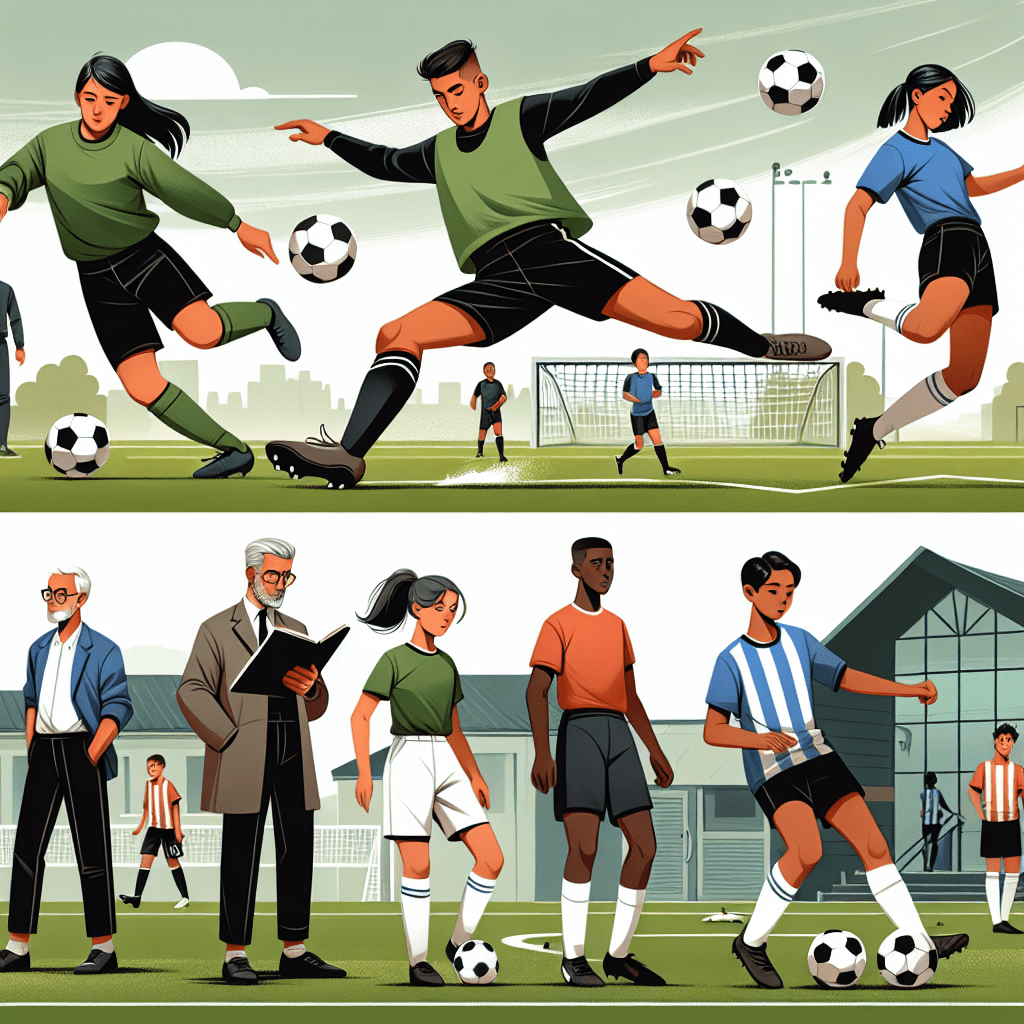[ad_1]
Building the Complete Footballer: Techniques for Enhancing Player Development
The journey to becoming a complete footballer is a multifaceted process that requires dedication, skill, emotional intelligence, and an unyielding passion for the game. The archetypal footballer must possess technical proficiency, tactical awareness, physical attributes, and psychological fortitude. This comprehensive guide explores various techniques and strategies for enhancing player development, with a view to helping coaches and players alike in their quest for footballing excellence.
Technical Skills
Technical proficiency is the cornerstone of a footballer’s skill set. It encompasses abilities such as dribbling, passing, shooting, and first touch. Developing these areas requires a structured training regimen that emphasizes repetitive practice, focused drills, and real-game scenarios.
1. Dribbling: Players should work on both speed dribbling and close control. Utilizing cone drills can simulate defenders, and varying the pace helps in creating game-like conditions.
2. Passing: Accuracy, timing, and the ability to use both feet are crucial. Passing drills should incorporate different distances and angles, encouraging players to adapt and make quick decisions.
3. Shooting: Emphasizing technique over power initially is key. Players should practice shooting from various angles and distances, also focusing on volleys and headers to diversify their goal-scoring repertoire.
4. First Touch: Enhancing a player’s first touch to control and manipulate the ball under various pressures and in different scenarios can significantly improve their overall game. Using a wall or rebounder to practice receiving and controlling passes can be particularly effective.
Tactical Awareness
Understanding the game tactically is what differentiates the good from the great. Tactical awareness involves the ability to read the game, make smart decisions, and understand one’s role within the team’s strategy.
1. Positional Play: Players should learn not only their role but also the roles of their teammates. This knowledge facilitates better decision-making and positional discipline.
2. Spatial Awareness: Developing an understanding of space and how to exploit it is crucial. Small-sided games can help players learn to create and utilize space effectively.
3. Decision Making: Fostering an environment where players are encouraged to make decisions and then reflect on them can accelerate tactical development.
Physical Attributes
A footballer’s physical condition plays a pivotal role in their performance. Speed, strength, agility, and stamina are attributes that need to be honed to compete at the highest level.
1. Speed and Agility: Sprinting drills, ladder drills, and plyometric exercises can improve a player’s explosiveness and ability to change direction quickly.
2. Strength: Functional strength training, focusing on core stability and leg strength, can enhance a player’s resilience and power.
3. Stamina: Endurance training such as interval running or circuit training ensures that players can maintain a high level of performance throughout a match.
Psychological Fortitude
The mental aspect of football is just as crucial as the physical and technical sides. Mental toughness, motivation, concentration, and confidence are integral to player development.
1. Mental Toughness: Techniques such as visualization, goal setting, and stress management can prepare players for the pressures of competitive play.
2. Confidence: Building confidence through positive reinforcement, focus on strengths, and constructive feedback can help players perform under pressure.
3. Concentration: Exercises that simulate match conditions, requiring players to maintain focus amidst distractions, can enhance a player’s ability to concentrate during critical moments.
Frequently Asked Questions (FAQs)
1. How can a coach assess a player’s development?
A coach can assess a player’s development through regular performance evaluations, both in training and match situations, considering improvements in technical abilities, tactical understanding, physical attributes, and psychological resilience.
2. What is the best age to start intensive football training?
While basic football skills can be introduced at a very young age, more intensive training should generally start around the age of 8-9, when children are more capable of absorbing complex instructions and undertaking rigorous physical activity.
3. How important is nutrition in football player development?
Nutrition is extremely important in player development as it directly affects a player’s energy levels, recovery times, and overall health. A balanced diet rich in carbohydrates, proteins, fats, vitamins, and minerals is essential.
4. Can technology play a role in developing a complete footballer?
Yes, technology can play a significant role in player development. Video analysis, performance tracking apps, and virtual reality (VR) training sessions can provide valuable feedback and simulate game situations that enhance tactical understanding and decision-making skills.
5. How often should a player train for optimal development?
While this can depend on age and skill level, optimal development is usually achieved with a balanced training regimen that includes 2-3 technical/tactical training sessions per week, complemented by physical conditioning and recovery periods to prevent burnout and injuries.
Building the complete footballer is a holistic endeavor that combines the development of technical skills, tactical awareness, physical attributes, and psychological resilience. Coaches and players must work in tandem, fostering an environment of continuous learning, self-improvement, and adaptability. Remember, the journey is as important as the destination, and with dedication and a structured development approach, players can achieve their ultimate potential.
[ad_2]






